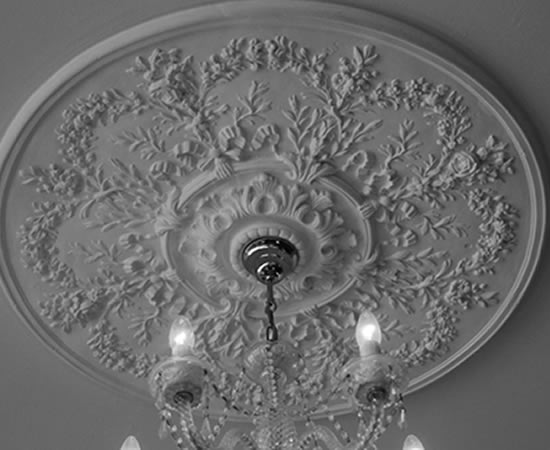Traditional stucco or pargetted plasterwork can often become damaged over time – especially if they are exterior mouldings. Years of weathering and pollution can cause discolour and gradually damage the work. However, this can be avoided with regular maintenance and careful cleaning. See some of our top tips below to help you safely clean and care for your plasterwork.
Before Cleaning
Before you attempt to clean your plasterwork, it is important to fully understand the materials it is made from and whether it has been fully sealed.
Sealed plaster can often be easier to clean because it is less porous whilst unsealed plaster can be difficult to clean without causing damage. Commonly, moulded plasters are likely to have been sealed or coated using a wide variety of materials such as paint, wax or a combination of potassium oleate and alum. If you are unsure, it is always best to consult a professional before attempting to clean.
During Cleaning
To safely clean a sealed plasterwork, we recommend test cleaning a small, out or sight area first before cleaning the whole area. If this is successful, lightly swab with water or white spirit; progressing across the plaster in small stages. Sticky marks can usually be removed by gently wiping the surface over with a clean, slightly damp cloth. Problem areas to watch out for include flaking plaster and areas of thin coating that might show gaps.
Dust can be removed with a soft cloth or brush, though take care not to knock the plaster with the metal ring at the end of the brush (ferrule). Plaster is slightly soluble in water and is vulnerable to damage from domestic cleaning products and abrasives, which will remove the surface layer. Its porous nature means that cleaning should ideally minimise the use of any liquid. Stains that have absorbed deep into plaster will be difficult to remove.
Dry Cleaning Plasterwork
If your plasterwork is not fully sealed, there are options available for dry cleaning. Natural rubber products that are free from moisture or chemicals (such as a Groomstick or white pencil erasers) are recommended and available. However, if you find from a test that these methods are not effective on your unsealed plaster, it is recommended that you consult a professional for further treatment.
Long Term Care and Repairs
Sometimes long term care can be difficult and require help from an experienced professional. This is where Fine Art Plasterwork can help you. Our experienced exterior repair experts can help you return your mouldings to their original beauty regardless of the intricacy of the work.
All of our exterior plasterwork is made to stand the test of time better - ensuring many years of stunning plasterwork finish.
If you’d like to learn more about Fine Art Plasterwork or any of the services we offer, you can give us a call on 020 8679 2533 or visit our contact page. Our Streatham showroom is also open for you to view a full range of our centre roses, cornice, corbels, columns and plaster arches
